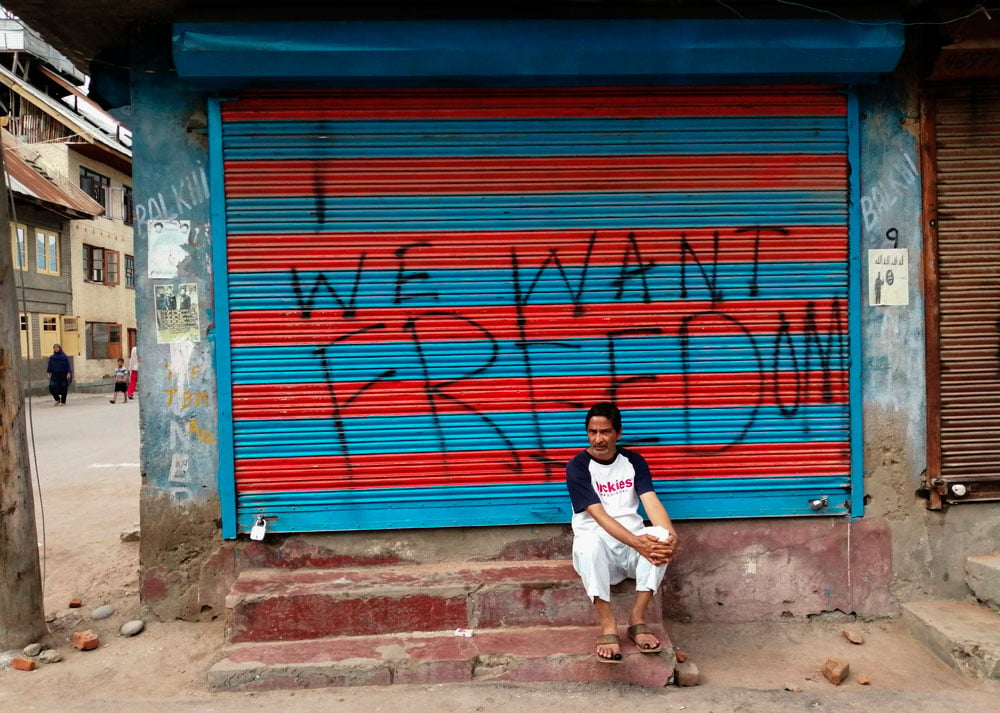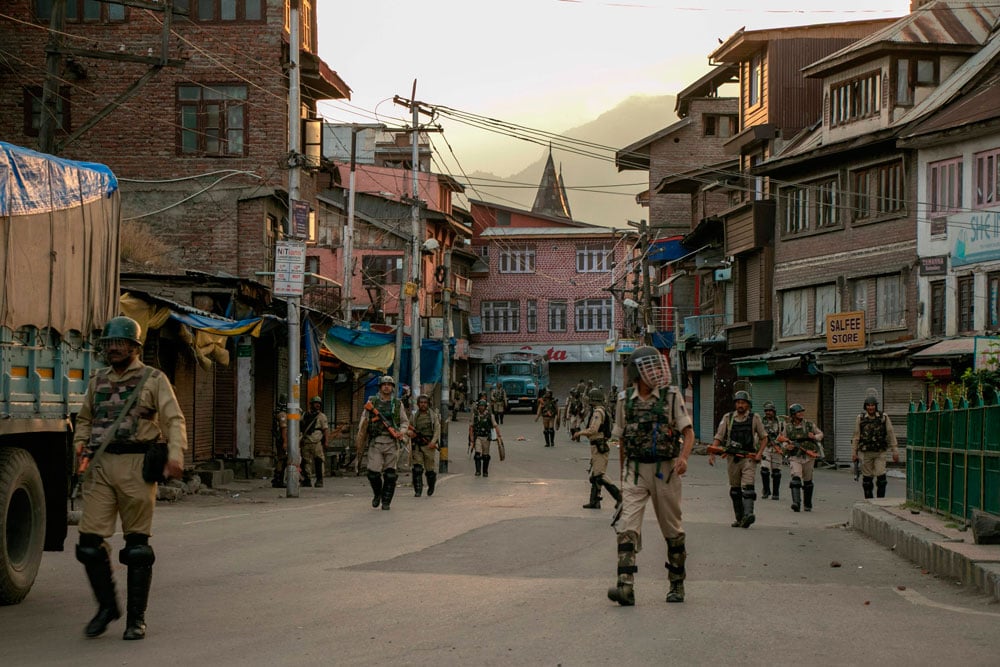Prior to August 5, 2009, India reinforced its contingent of over 700,000 troops and turned occupied Kashmir into a virtual prison. On that fateful day, it took Amit Shah, the Indian union home minister, a little over seven minutes to strip away the constitutionally guaranteed autonomy of the state and turn it into two inferior appendages.
Days and weeks prior, people there had a foreboding sense of an intrigue in the works, despite deceptive denials by the Indian authorities. Deception throughout has defined the Indian behaviour towards Kashmir, starting from the moment the then state ruler was forced to sign an instrument of accession with the Indian Union in 1947. That accession had provided only for a temporary and limited relationship between the state and the Indian Union subject to a final status to be decided through a referendum.
The Article 370 of the Indian constitution manifested the only link between the state and the union. The article and autonomy guaranteed to the state through it restricted powers of the Indian government. To overcome those limitations, the Indian government played legal sleight of hand that, had the judiciary been not hollowed out by the Modi regime, those acts would not stand legal scrutiny. They used Article 367 to narrowly reinterpret the constitution to do away the requirement of the consent of the state constituent assembly, which does not exist, to make Article 370 inoperative through the subsection (3) using the governor as the state authority for consent, despite being an appointee and representative of the union government and not of the state.
Had the Indian government been confident about its delusional claims since August 5, 2019, then why would the entire population of occupied Kashmir be incarcerated and that legal fraud forced down the throat through high-handed measures aimed at intimidation?
A few basic facts merit unbiased perusal with one being that the act of accession to India never ever attained acceptance, or legitimacy within occupied Kashmir, which coupled with an ugly haste for dominance and forced assimilation only hardened local attitudes against the Indian state. The first major inflection point came when the Indian government, on August 9, 1953, dismissed Sheikh Abdullah, the then prime minister of the state. That act of betrayal and deception lacked any legal sanctity. After his dismissal, Sheikh Abdullah spent the next 20 years in and out of various prisons; the Indian rule since then in the state had all but consistency of an orchestrated charade.

The staged democracy in the state was maintained through liberal dole-outs, predetermined elections using Indian intelligence agencies as major conduits, which to keep things under control bribed, and propped local politicians and then spied on them. The state politicians maintaining the charade for India were handsomely compensated but never trusted.
Successors of Sheikh Abdullah after his 1953 dismissal ran the state through patronages and brutality. Successive Indian governments, surreptitiously, instigated the overt and covert process of erosion of the autonomy of the state through salami tactics. All those acts of duplicity on the part of the Indian government did nothing but harden the attitudes of the local population that perceived those measures as acts of aggression. But none of the previous governments had been as foolhardy as the rabid rightwing Modi government. They, through their historically steeped ignorant arrogance and a contrived vision of a Hindu India, have indulged in an unprecedented legal heist without much thought for the ultimate human cost.
The audacity for that blatant act by the Modi government traces to the poisoning of Kashmir politics by earlier Indian governments. In the mid-1980s, the Indian government appointed Jagmohan, a highly divisive and controversial figure, as the governor. Jagmohan not only vitiated politics in occupied Kashmir but also disrupted the syncretic traditions of Kashmir through selective communal patronages. The final breach came through blatant rigging of the state elections in 1987 where the National Conference of Farooq Abdullah, in alignment with the Indian Congress, was opposed by the Muslim United Front. Not only did they steal the elections, but the authorities unleashed atrocities on the opposition party and its supporters.
The deliberate heinousness brought in violence and disaster in occupied Kashmir that no one had imagined. Some vested groups try to portray that occupied Kashmir fell to 'Islamic violence' but nothing could be farther from the truth. The militancy took over occupied Kashmir because of Indian blighted myopia. Youth in the valley were left with no choice but to pick up guns to fight the Indian tyranny. Occupied Kashmir, thereafter, was never the same again.
At the very start of the violent rebellion in 1989, the Indian state proved to be utterly clueless and fragile. And, in a deliberately naive move, it once again appointed Jagmohan as the governor; the state government resigned in protest. It was under Jagmohan that the Indian security forces unleashed a regime of tortures, excesses, extrajudicial murders, forced disappearances, and rapes against the civilian population. Even when the struggle against the Indian domination changed from armed insurrection to peaceful protests, the security forces maintained their unreformed brutal zeal.

Things were bound to deteriorate once the rabid rightwing party, led by Narendra Modi, gained power in India. Removal of the state autonomy was always high on their agenda. Armed with a bigger majority than before in the elections of 2019, the Modi government did away with legal niceties.
The human made laws unlike laws that govern the nature can and are subject to capricious violations when lawless persons take over power. Modi, steeped in rabid Hindu extremism, was never going to be bothered by constitutional restrictions. The constitutional coup by the Indian government vis-a-vis Kashmir far from culmination rather marks the first step of their cherished mission of humiliating and subjugating the population into submission. India cherishes Kashmir sans the people. If the past two months are any indication, that mission is already in progress.
Where in the world would incarceration of the entire people be an acceptable norm and to deny them the right to access to the outside world, health care, or even the right to mourn their dead? Politicians, lawyers, labor leaders, activists and even journalists doing their jobs have been subjected to indiscriminate incarcerations, with many shifted to hostile prisons outside the state. Even children as young as eleven are forcibly taken from their homes leaving parents in dark miseries.
The only silver lining that remains is that excessive Indian hubris has once again pushed Kashmir on to the world stage. International media, to the considerable consternation in Indian circles, is widely covering the inhumane lockup of the entire Kashmiri population. The governments around the world have started raising their concerns. Now would be the time to continue the exposure of Indian excesses.
India might try to portray an alternate reality but nothing can be farther from the truth. Besides inhumane treatment of the people, the Indian actions have destroyed the economy of Kashmir and jeopardised livelihoods. The continued Indian actions will result in destitution of the most vulnerable in occupied Kashmir. If these are not acts of brutality, what else is?
Kumar is a professor at the University of Heidelberg. He served on the faculty of Kashmir University from 1984-1990. He can be reached at [email protected]


